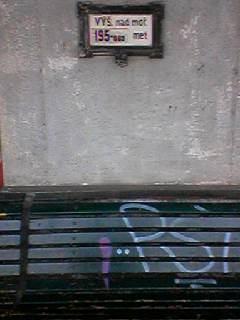« April 2006 | Main | August 2006 »
May 31, 2006
Our Sweeping Generalisations
The point of the following remark is not to subject to criticism the Guardian, which I after all read and believe to be a competent newspaper. The point rather is to show at an exceptionally illustrative sample to what staggering extent we rely on vastly generalising formulas and theoretical explanatory schemes even while believing we are still talking pure facts.
The story starts with a detention by Chinese authorities of a local real-estate agent in Nanyang, Henan, on accusations of sexual abuse of school-girls under age of consent, the case evoking exceptional attention in that it proves to be in fact a case of mass voluntary prostitution on the part of the children.

As long as we refuse to accept phenomena like these as mere accidental occurrences of the natural world on the par with typhoons or fluctuations of stock markets, we seek explanations. That is, we attempt to make sense of such incidents by incorporating them into one or another of the conventionally accepted frameworks of social, moral, political, psychological causes and effects. We need to understand in some way and it is probably part of an instinct to keep our world together. And in situations like these every single one of us turns into an amateur philosopher and social theorist, often so smoothly as to remain unaware of the shift. The text of the Guardian article of mid-May reporting the affair goes on as follows:
The inquiry began last September when parents asked the school why their daughters were suddenly wearing new dresses and spending money they had not been given by relatives. The girls admitted selling their virginity and revealed Mr Deng's mobile phone number.
China's moral compass has been spinning wildly since the start of the government's economic opening policy in 1978. Communist ideology has been replaced by a worship of money, while the movement of 100 million migrant workers to the cities has transformed traditional family relations. At the same time, the influx of global culture, particularly through the internet, has encouraged people to experiment more in their personal lives.
Without a blink of the eye, without the least hesitation, the focus of the perspective changes from the micro-scale of a local event concerning several scores of provincial locals on a September day, to the macro-scale of hundreds of millions inhabitants of a whole continent enwrapped in supposed historical, social and demographic transformations spanning some thirty years. Given the immenseness of the jump in scale, it is remarkable that the language can carry it at all.
Now, admittedly, it is a feature of good journalism to provide a wider framework for the isolated incidents of merely topical news. And within the scope of a newspaper article it may well be impossible to resort to anything other than such sweeping generalisations. The point rather is that this can be done with such ease that a reader probably does not even pause over the borderline between the two worlds. The whole of the above quote will appear to most eyes as a continuous statement of empirical fact: arrest of the malefactor; sale of virginity by a score of school girls; wild spinning of China's moral compass; worship of money; movement of millions; transformation of traditional family. Unless trained or particularly attentive, a reader probably will not notice where the text carried him so self-evidently across the border between fact and theory.
Posted by david at 12:44 PM | Comments (0)
May 25, 2006
A Postmodern Tomb of Ideologies or a Toilsome Path to Mother's Grave?
“Man is born in chains. In chill – he gropes his path to decay. Without end he drags the cart of evil through history. Heavy wagons along muddy roads.”
– Patrik Ouředník. Opportune Moment, 1855
Unlike his famous emigré compatriot Milan Kundera, Patrik Ouředník – another Czech writing from France, where he exiled himself in the 1980's – remained largely unnoticed, until his short fiction-documentary Europeana came out in 2001. The eerily unorthodox overview of the twentieth century has by now been translated into 20 languages and made something of a hit in places as historically disparate as Hungary and the Netherlands. In author's own words, if a book like that sells more than a couple of thousand copies, there is almost certainly a misunderstanding involved. But might there not be a real passion, on the part of those who lived through at least part of it, to try an grasp that strange century by any as yet untried means?
Far from a history by any standards, Europeana is somewhere between the stream of consciousness and the Macbeth's ‘tale told by an idiot’: a semi-absurd sequence of facts, quotations, anecdotes, and margin captions meant to evoke a history textbook, it stubbornly refuses to conform to any hierarchy of events by making no distinction between the (allegedly) major currents of the times and insignificant incidents accompanying them. That everything in the narrative is factually correct only adds to the chilling effect.
It is language that features prominently: slogans and rallying cries and newspaper headlines and contemporary ditties and lists of clichés, the uses of words create the portrait of the strange and rushed century. Ouředník’s editorship of the first dictionary of Czech slang and argot, compilation of another dictionary of the history of usage of biblical terms in everyday speech, his own experimental poetry, translations between French and Czech, essay "A la recherche de la langue perdue", all point to a concern with language, its uses, twists, distortions, genres, ideological manipulations, misappropriations. But then this might be something central-Europeans are somehow fatally predisposed to.

The latest novel by Ouředník, now published simultaneously in Czech and French versions, deals with another moment in history: the ‘opportune moment’ to create a new world overseas which for many Europeans came in the middle of the nineteenth century, with the revolutionary enthusiasm still vivid in memory but already frustrated enough by realities of the diseased Old World.
The book consist of two distinct parts corresponding to two types of text, both first-person narratives; the first a letter, the second a (possibly fragmentary) diary. There is no bridging unity of a preface or afterword provided by the author himself. The letter is apparently written by an aged and disappointed man, an Italian and passionate anarchist, an ideologue and organizer of the movement of sorts, educated, but hostilely sceptical toward the course of western civilisation. Writing to a woman he once loved and surveying his ending life, he concentrates on his failed project – half a century ago – of founding in Brazil a free settlement Fraternitas for volunteeering European enthusiast revolutionaries and poor commoners. The diary, then, is a record kept by one of the motley group of participants in the project back in 1855, and also the only extant trace and memory of the settlement.
The voice of the diary has an uncouth ring of unsophisticated naivety, as it ranges indiscriminately events, quotes of speeches and bits of conversations, rarely attempting to establish any order among them. The only feeble suggestion of some sort of connection between the ideal of anarchist socialism and the actual practice of lives of the settlers are random transcriptions in the diary of ever more hopelessly and hollow sounding pronouncements on nature of man or freedom, on the promised land, on liberation from the shackles of civilisation, made by the various leading figures in the group: an authoritarian Zeffirino, French communist Gorand, an eternal nonconformist Decio.
While the same effect employed in Europeana produced an atmosphere of scepticism bordering on cynicism, the Opportune Moment is more than an explosion of yet another utopian ideology which proposes to build up a new world and either crash-lands upon encountering the everyday reality of human natures, or transforms itself into a deadly tyranny over bodies and minds in an attempt to channel the resisting world into predestined courses. The Opportune Moment is arguably more profound, or at least more complex here: the idiot’s tale is not a total judgement over the meaning of history; here it has behind it a real human face and a painful path through a real life. There is an honest desperation and hope in the hopeless search for a better world.
Language of the diary gets stuck and runs in circles as Fraternitas approaches its final crisis. Time seems to stop as consecutive entries now all bear the same date, 15th October 1855, and the same sentences keep reappering in increasingly disorderly fashion, creating an effect rather like that of the Theatre of the Absurd, the collapse of meaning emergent in plays by Ionesco, Beckett, or Havel. With the end in sight a rarely personal record of a dream appears: diarist’s mother rises up from her deathbed and leads him to the cemetery where she sinks into the ground telling her son they will now have chance to see each other often. Where Europeana led us to a postmodern scribble-covered tombstone of an absurd century, Opportune Moment leaves us by the side of mother’s grave. And that’s perhaps still a humanly more hopeful alternative.
Patrik Ouředník. Příhodný okamžik, 1855. Torst, 2006
–––. Instant propice, 1855. Editions Allia, 2006
(English translation under title of Opportune Moment, 1855, due to appear shortly)
–––. Europeana. A Brief History of the Twentieth Century. Dalkey Archive Press, 2005
–––. Europeana. Une brève histoire du XXe siècle. Editions Allia, 2004
Posted by david at 02:59 PM | Comments (0)
May 14, 2006
On Simplicity
It is very easy to make an idol out of the notion of simplicity. Notions are distinct from things or states of affairs, and speaking of the notion of simplicity does not inevitably mean speaking about simplicity, or its merits. It rather means speaking about how a particular term (simplicity) is used as an expression of normative standard, as a yardstick against which qualities of things, actions, or statements are measured. To say that using the notion of simplicity as a normative standard is potentially problematic does not by any means imply denying that "simple is beautiful". Simple presumably indeed is beautiful (even though the red light of dialectic awareness – thoroughly cultivated by classics ranging from I-t'ing and Heraclitus through Vico to Marx – immediately goes on to warn us that "simple" is always a complementary affair, that it almost certainly latently involves or at least implies orders of high complexity, that, in other words, simplicity at one level of description will turn into an affair very far from simple at another level of description, that simple may prove to be not that "simple" at all…).

Are things that cannot be expressed simply just not worth expressing? In other words, can simplicity be forged into an absolute measure of worth and truthfulness? Not only that such claim is highly disputable, it probably carries slightly totalitarian tendencies in it. To postulate that simplicity is the ultimate standard necessarily presumes that existing problems, conflicts, dichotomies, and questions, all in principle have a clear, unambiguous, "simple" answer and solution. If simplicity is the thing, there must be a simple formula to settle every dubious point. That relegates any difficult complexity of non-simple treatments of problems, conflicts, issues, into the dustbin. For such difficult complexity then can only be possibly conceived as showy intellectualism or muddleheaded self-absorbed dreaminess, neither of which is capable of simply getting things clear.
This stance can assume interestingly wide array of guises: the cult of simplicity has been prominently romantic in its many documented historical varieties; but it can just as well pose as a rationale for very cynical types of world-view. For one thing, an ostensible preference for things and statements "simple" has often been a convenient excuse for intellectual sluggishness and sloppiness, or even for a more fundamental type of mental laziness: if something requires effort to be understood, then it is at fault, not my lack of perseverance in trying to grasp the meaning.
Of course, the distinction here is tricky, because there actually is beyond doubt any number of examples of statements, sermons, speeches, texts, etc. which render simple truths in convoluted and strained language, or worse still, which hide their hollow emptiness behind a facade of verbose terminological jungle. The gift of clear expression and lucid writing is as immensely valuable as it is rare. However, if there are subjects that do not lend themselves easily to a simple and brief statement, this probably still does not disqualify the subject as such. After all, we do not expect an untrained mind to be able to effortlessly and immediately penetrate the formulations of the general theory of relativity, of Crick's and Watson's description of DNA double helix, or of Edmund Husserl's elaboration of transcendental phenomenology. Still, all of these do have something crucial to say to our understanding and self-understanding as human beings, although they undoubtedly require study of expert vocabularies and conventions of logical argument to even begin to be vaguely comprehensible.
That something is "difficult to understand" surely cannot be counted as the sole disqualifying factor in its disadvantage. Little profound beauty or value or significance is to be found without some degree of effort. And it is impossible to know whether the effort is actually worth the result obtained, unless there exists at least a modicum of mental readiness to make such effort. At the end of, or at least half way down, a difficult text or film we may – most likely we often will – well find that the effort is not worth it. But, as is usually the case in this joyfully ambiguous and multifaceted world of ours, there is no simple way to cut the Gordian knot by disposing wholesale of all those observations and statements which someone may find not suiting their taste just because they are not sufficiently simple. Simple is by no means identical with simplistic.
Posted by david at 05:18 PM | Comments (0)